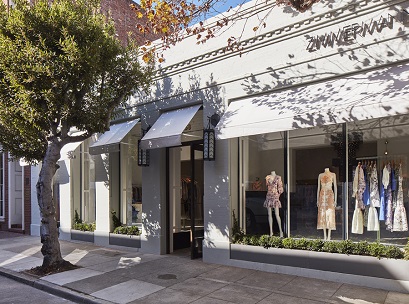We’re all cognisant of the burgeoning – and disruptive – influence of the sharing economy across a number of industries. Think AirBnB’s domination of the hotel and accommodation market, ZipCar replacing car ownership for many millennials, and bike-sharing programs in major cities from Melbourne to New York. The retail sector has been slower to jump on the sharing wagon, but in the fashion industry the movement is thankfully and rapidly gaining momentum. A Business of Fashion report has a
already labelled 2019 the year that ushers in the “end of ownership”, while Vogue’s sustainability editor, Clare Press, is asking “Can a circular fashion system save us all?”
From niche to mainstream
It’s a prescient question. While it’s heartening to see the growth in this space, I dream of a future where sharing, rental and refurbishment models are so ubiquitous that they are the norm in the fashion industry, not part of a niche market. A time when the circular economy is so ingrained in our way of living and consuming that it won’t be news any more, and rather we’ll be wondering which sustainable innovation will come next?
Back in 2016, I was a 25-year-old fashion junkie with my eye on a designer dress to wear to an event. The price tag? Upwards of $1000. My partner, Costa, had something to say about that: “Don’t do it, you’ll wear it once”. And I knew it: my closet is full of dresses like that. After some digging, I found a dress to rent online via Facebook. I chose a beautiful black lace halter dress, got some lovely comments at the party, and it was a friendly and eye-opening experience. Yet, I was dismayed by having to share my credit card details via email to pay the rental and postage of the dress.
This experience planted the seed for Costa and me to build and launch Designerex, the AirBnB of designer dresses. While the pioneers of the rental idea, such as the US’s Rent the Runway and Australia’s GlamCorner, were starting to thrive on an inventory model, we wanted women like me to be able to access and share high-quality, beautiful clothes without central ownership. We also wanted to give incentive to go out and splurge a few times on a designer dress, which might reduce all those last-minute shopping trips for pieces that won’t last a lifetime and are contributing to social and environmental issues that are, thankfully, increasingly in the spotlight.
Within a year of launching in Australia, we had more than 10,000 listings on the site. Clearly, the appetite for change is out there, and it feels really good to be a part of disrupting the industry that, according to the ABC’s War on Waste, sees Australians throwing away six tonnes of fashion and textile waste every 10 minutes.
The good news is we’re already on the way to becoming a society that wholly embraces the concept of sharing, rather than one of gratuitous consumption. Examples abound. There’s the UK’s Streetbank, the peer-to-peer sharing platform for neighbours to give, rent or share things and skills with each other; the borrowing platform Peerby, founded in The Netherlands but available worldwide, including here in Australia; and the Library of Things, named for the global movement of the same moniker, a London-based social enterprise that lends out everything from DIY equipment and camping gear to kitchenware and wetsuits.
There’s appetite for sharing across all categories – and in fashion, the vision for change is immense. In the US, Rent the Runway’s Jennifer Hyman has clear intention: “I plan to put Zara out of business,” she said in 2017. Just imagine what this could mean for the future of fashion ownership if industry behemoths like H&M, Country Road and Cotton On take full heed of the radical and essential philosophies driving the sharing economy? As consumers become more and more selective with their credit cards, I dream of a future where fast-fashion companies shift their values, producing sustainable rather than disposable clothing. This would be essential were any brands to consider adopting sharing programs into their business model.
And the future is already happening. Research is showing behavioural shifts in the modern consumer, who wants to reduce their impact on the planet – and also access lots of beautiful things.
Balancing those two needs seems to be the key for the future of ownership. As the Business of Fashion report identifies, millennial shoppers “crave newness, and these cohorts are much more likely to embrace churn in their wardrobes”. Particularly in this hyper-documented Instagram age, more and more young people consider it a complete faux pas to be photographed in an outfit twice.
How did it get to this point? Well, given that today’s average consumer buys around 60 per cent more items of clothing than they did 15 years ago, it’s little wonder that we are so accustomed to being presented with newness and endless choice on our newsfeeds and in our wardrobes.
But at odds with our craving for all that is new and on-trend is a concern for the environment and sustainable clothing – a concern that is much stronger in millennials than in older generations. Circular or peer-to-peer models of ownership provide a workable solution to this friction between choice and sustainability. They lengthen the life cycle of a piece of clothing, while offering access to a limitless wardrobe – last-minute “shopping trips” galore.
And that’s the beauty of this new circular world – there’s no need to sacrifice what you care about. Love beauty and style? You can still step out in that new season Alice McCall or Zimmermann playsuit while retaining your eco credentials and (most of) your paycheque.
So can the circular fashion system can save us all? My answer is a resounding yes. There’s no doubt in my mind that the sharing economy is the future of fashion and retail – it’s economically sound, democratic and sustainable. And the truth is, the future is happening now, driven by rental and resale businesses disrupting the old guard and conscious consumers who are agitating for change and embracing their ever-growing communal wardrobes.
Kirsten Kore is the co-founder of Designerex, the world’s largest peer-to-peer designer dress sharing platform, which she formed at age 25 in Australia with her partner Costa Koulis.







